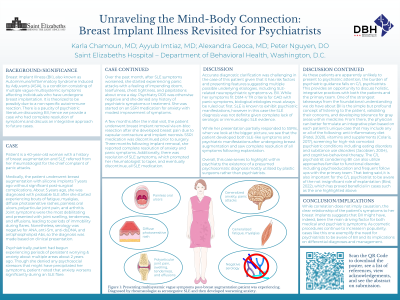Women's Mental Health
(234) Unraveling the Mind-Body Connection: Breast Implant Illness Revisited for Psychiatrists


Alexandra Geoca, MD
Psychiatry Resident
Saint Elizabeths Hospital
Washington, District of Columbia- AI
Ayyub Imtiaz, MD
Psychiatry Resident
Saint Elizabeths Hospital
Washington, District of Columbia 
Karla T. Chamoun Rosario, MD
Psychiatry Resident
Saint Elizabeths Hospital
Washington, District of Columbia- PN
Peter Nguyen, DO
Psychiatrist
Psychiatry
Washington, District of Columbia
Presenting Author(s)
Co-Author(s)
BACKGROUND/SIGNIFICANCE:
Breast Implant Illness (BII), also known as Autoimmune/Inflammatory Syndrome Induced by Adjuvants (ASIA), is a condition consisting of multiple vague multisystemic symptoms affecting individuals who have undergone breast implantation. There is a paucity of psychiatric literature discussing BII, theorized to be due to a non-specific autoimmune reaction.
Case:
Ms. AD is a 40-year-old woman with a history of breast augmentation and SLE who presented with panic attacks. Patient had silicone breast implants 7 years ago without post-surgical complications. About 5 years ago, she started experiencing bouts of fatigue, myalgias, diffuse photosensitive rashes, painless oral ulcers, polyarticular joint pain, and arthritis. Nonetheless, serology was negative so the diagnosis of SLE was made based on clinical presentation only. Patient developed generalized anxiety 2 years ago, but over the past month these had worsened to panic attacks with a feeling of impending doom, tearfulness, chest tightness, and palpitations about once a day. Ms. AD was started on an SSRI medication for anxiety with modest improvement of symptoms.
A few months after the initial visit, Ms. AD underwent breast implant removal via en-bloc resection after she developed breast pain due to capsular contracture and implant necrosis. SSRI medication was discontinued prior to surgery. Three months following implant removal, Ms. AD reported complete resolution of anxiety and panic symptoms. Additionally, there was resolution of SLE symptoms, which prompted her rheumatologist to taper, and eventually discontinue, all SLE medication.
Discussion:
Accurate diagnostic clarification was challenging because her presentation partially responded to SSRIs, but we see that the patient developed both SLE-like symptoms and psychiatric manifestations after undergoing breast augmentation and saw complete resolution of all symptoms following explantation.
Overall, this case serves to highlight that these patients are unlikely to present to psychiatric attention, so the burden of psychiatric guidance falls on C/L psychiatrists. One of the strongest takeaways from the foundational understanding we do have about BII is the simple but profound concept of listening to the patient and validating their concerns. From there, the physician can better formulate an integrative plan that may include the following: anti-inflammatory diet (Patel, 2020), vitamins and supplements, screening for high-risk comorbid psychiatric conditions including eating disorders and substance use disorders, and cognitive-behavioral therapy. It is also important for the C/L psychiatrist to be aware of the role of explantation (Bird, 2022), which has proved beneficial in cases such as the one highlighted above.
CONCLUSION/IMPLICATIONS:
As cosmetic procedures continue to increase in popularity, cases like the one of Ms. AD exemplify the need for psychiatrists to be aware of BII and its implications on differential diagnoses and management.
References:
-Patel A, Blackmore K, Carruthers R. The Integrated Treatment for Chronic Pain and Anxiety in a Patient with Breast Implant Illness Symptoms: A Case Report. Integr Med (Encinitas). 2020 Aug;19(4):28-33.
-Bird, G.R., Niessen, F.B. The effect of explantation on systemic disease symptoms and quality of life in patients with breast implant illness: a prospective cohort study. Sci Rep 12, 21073 (2022).
Presentation Eligibility: This work is to be presented at Saint Elizabeths Hospital Overholser Day 2024 on April 17, 2024 as part of an in-hospital one-day conference for psychiatry resident research. It has not been submitted for review or publication elsewhere.
Diversity, Equity, and Inclusion: Breast Implant Illness impacts both cisgender and transgender women undergoing cosmetic breast augmentation. As there has not been much literature published regarding this condition from a psychiatric perspective, our poster sheds light on a rare condition within a marginalized group of population. As there are concerns of Breast Implant Illness being psychosomatic, many patients are turned away and told their symptoms are fake resulting in stigmatization of their symptoms and condition as well. Our authors includes a mixture of genders, degrees, and international medical graduates versus American university medical graduates incorporating various cultural points of view into the abstract.

